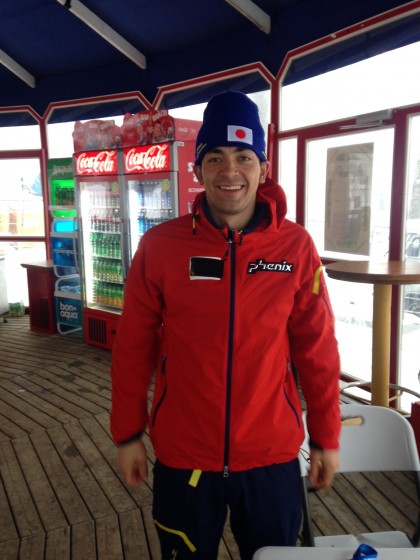
FasterSkier’s coverage is made possible through the generous support of Swix.
KRASNAYA POLYANA, Russia – Japanese cross-country skier Akira Lenting traveled all the way to the Sochi Olympics for one race: the 20-minute, 10-kilometer anchor leg of the men’s relay.
There wasn’t a huge amount of pressure on the Japanese team at the games—their skiers are good, but not great. And Lenting’s own goals for the relay were modest. A finish in the top six, he said, would have been a success, after two eighth-place finishes in Japan’s last two races.
In short, in Lenting’s athletic pantry here, there were none of the ingredients in the recipe for classic Olympic disappointment.
When Lenting, a tall, cheerful 23-year-old, arrived at the cross-country venue on Sunday, he started his warmup.
His teammates were already out on the race course, where, unbeknownst to Lenting, things had gone wrong from the beginning.
Hiroyuki Miyazawa, Japan’s first skier, dropped two minutes to the leaders; he was stuck with skis that were gliding more slowly than his competition’s. His team had chosen either the wrong skis for the conditions, the wrong structure ground into the skis’ plastic bases, or the wrong wax—a problem that afflicted more than one country that day.
Keishin Yoshida, the team’s second skier, fell two minutes further back before passing off to Nobu Naruse—the man who was supposed to tag off to Lenting for Japan’s fourth and final 10-kilometer segment.
Lenting hadn’t seen what was happening. He ended his warmup, then went to the finish, where he waited in his racing spandex for Naruse to arrive, and tag him.
Lenting is a good skier. Earlier this month, he placed in the top 30 on the World Cup—the benchmark for being internationally competitive—for the second time.
He’d trained specifically for the relay, since it would be his only race at the games.
But as Naruse made his way around the course on Sunday, the men from Sweden, the leading team, were skiing their 3.3-kilometer laps so much faster that they were threating to catch Japan from behind.
The loop here was short enough that if Japan fell more than seven minutes back, they’d get lapped, and officials would pull them out of the race.
Eventually, Naruse approached the finish. But as he did, he was in last place, trailing by six-and-a-half minutes. Marcus Hellner, Sweden’s anchor, was already in sight, nearing the end of his first lap before Lenting had even had a chance to start his own.
That’s when a race official found Lenting.
“Sweden is coming. So you can’t start the relay,” Lenting was told.
He hadn’t even begun racing, but his Olympics were over.
“At first, I can’t say anything,” said Lenting, who speaks functional English and spent five months last summer living and training in Sweden.
Since he couldn’t race, he went back out and skied for another hour. Then, before he could go back to the athletes’ village, he was selected for a drug test, which took another 45 minutes. He watched the post-race recognition ceremony on a television while he waited.
When he found his teammates afterwards, Lenting said, they apologized.
He was initially disappointed, and sad, he said.
But by Tuesday, he seemed to be doing fine. Even without the race, he was glad he had made the trip to Russia.
“I am still happy,” he said. “This experience is good for me, I think, to be more strong for the next Olympics.”
There are two more men’s cross-country ski races left here: the team sprint, and the individual 50-kilometer freestyle race.
But Japan already has two other men entered in the team sprint, and Lenting did not meet his country’s strict qualification criteria to compete in any of the individual races at the games. He’s leaving the Olympics on Thursday.
American cross-country skier Erik Bjornsen knows Lenting from competing in international junior races together.
Bjornsen saw Lenting standing at the start on Sunday, waiting for Naruse to get there, when the officials pulled him from the race.
“I was just like, ‘Oh, man.’ I felt so bad for him,” Bjornsen said. “He’s a fast skier. But it’s just, like, wrong place, wrong position at the wrong time. Coming so close to being able to race at the Olympics, and then not getting that start—it’s sad to see.”
Nathaniel Herz
Nat Herz is an Alaska-based journalist who moonlights for FasterSkier as an occasional reporter and podcast host. He was FasterSkier's full-time reporter in 2010 and 2011.



